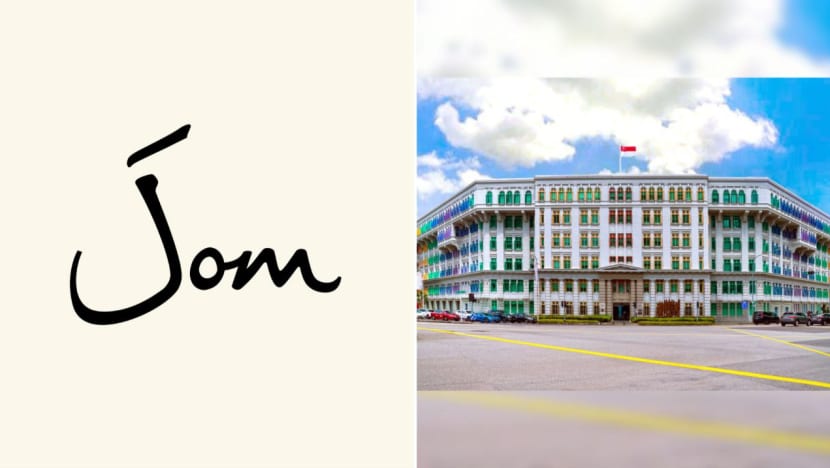GE2025: Online publication Jom flouted online election advertising rules by boosting articles' access on social media
During the election period, Jom had paid to boost the reach of a few of its articles that are deemed as advertisements on Meta's platforms such as Facebook and Instagram.

Digital magazine Jom's logo (left) and the Old Hill Street Police Station that now houses the office of the Ministry of Digital Development and Information (right). (Photos: Jom/MDDI)

This audio is generated by an AI tool.
SINGAPORE: The advertising of three articles by online publication Jom was blocked in Singapore by Meta because it was considered unauthorised third-party paid online election advertising (OEA) and Jom had given the articles "amplified access", the Ministry of Digital Development and Information (MDDI) said.
During the election period, Jom had paid for advertisements on Facebook and Instagram to boost the reach of those articles. Meta is the parent company of these social media platforms.
The advertisements containing links to the articles violated regulations for OEA, the ministry said on Wednesday (Apr 30) in response to queries from CNA.
It stated that Singapore citizens and entities are allowed to publish OEA that are not paid, and articles on Jom’s website that constitute such unpaid OEA are still accessible to the public.
OEA is defined under the Parliamentary Elections Act (PEA) as any information or material published online that "can reasonably be regarded as intended to promote or prejudice the electoral success or standing of a political party or candidate, even though the information or material can reasonably be regarded as intended to achieve some other purpose as well", the ministry said.
The three articles by Jom that criticised or praised political parties, candidates and their policies satisfy the legal definition of OEA, it added.
The articles are titled:
- Is Shan a good bad cop?
- The system has stopped evolving: why Harpreet Singh joined the opposition
- Affordability in the lion city: is Singapore’s public housing model built to last?
The Infocomm Media Development Authority (IMDA), as the assistant returning officer of this election, issued Meta corrective directions on Apr 23 to disable access for Singapore users to Jom’s related advertisements.
"The rules on OEA apply to everyone, including online commentators such as Jom. These rules have been observed by other online commentators," the ministry said.
Under the law, only political parties, candidates, election agents and authorised third parties can publish paid OEA and this must also be declared to the returning officer.
MDDI said that this rule is in place to ensure transparency and accountability and prevent the use of paid advertisements to bypass the election expense limits for political parties and candidates.
The publishing of unpaid OEA is also prohibited during the cooling-off period for election campaigning, which lasts from midnight on May 2 until polling closes on May 3.
Jom said in its Facebook and Instagram posts on Tuesday that it was informed by IMDA that its articles flouted the PEA regarding OEA and that it was barred from "promoting ('boosting') our work on Meta".
It also said that it reached out to Meta and was informed of the same thing.
On its social media accounts, Jom states that it is a weekly digital magazine "covering arts, culture, politics, business, technology and more in Singapore".
It said on Tuesday that its ability to grow its readership and business through social media is vital and that the articles in question are still available to read on its website since the authorities' order was just to prevent it from promoting the articles through Meta.
Meta states on Facebook that users who want to advertise on its platforms may do so by boosting a post or creating an advertisement.
A boosted post is an advertisement created from an existing piece of content that the users have published on their Facebook Page or Instagram account and this will help the post to reach more people on Facebook or Instagram.
The technology company also states that boosted posts are still considered ads because they require a budget to be shared with a wider audience.
Editor's note: An earlier version of this article stated that Meta had blocked three Jom articles. This is incorrect. It was the paid advertising of the articles that was blocked. We apologise for the error.


















